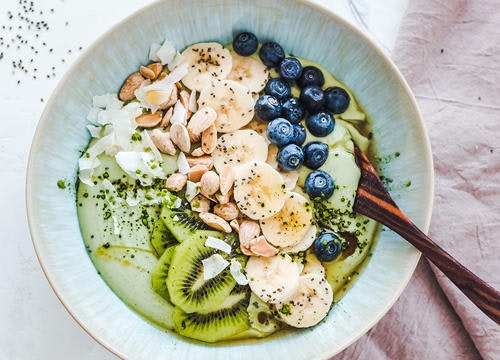5 superfoods to boost your immunity


While the saying “an apple a day can keep the doctor away” still rings true, there are actually many foods that can help support your immune system. Here are just a few of our favorite immune-boosting foods along with tips on how to add them into your daily routines.
Yogurt and other fermented foods
Our guts are full of bacteria, and for a good reason. Healthy bacteria, called “probiotics” or “live cultures,” help keep our digestion systems regular and play a role in a healthy immune system.1
Many fermented foods contain probiotics, including:
Yogurt
Miso
Sauerkraut
Kimchi
Kefir
Aged cheeses
Yogurt gives you one of the biggest bangs for your bacteria buck and is quite a versatile ingredient. Plus, dairy-based yogurts and some fortified plant-based yogurts contain vitamin D, another important nutrient for immunity.2
Buying tip
Check out the ingredients list on your favorite yogurt to see the live active yogurt cultures. To get a variety of probiotics, look for a yogurt that contains five or more strains (Lactobacillus bulgaricus and Streptococcus thermophilus being two of the most common strains).
How to enjoy
Enjoy yogurt by itself or as a parfait alongside your favorite chopped fruit and nuts
A ½ cup of nonfat Greek yogurt makes for a great base for smoothies
Use yogurt as a healthy 1:1 sour cream swap in savory recipes
Green tea
There’s a reason why tea is a go-to beverage when you’re not feeling well. While research is still ongoing, some studies suggest specific antioxidants in green tea may play a role in easing symptoms of a cold or the flu.3
It may be because many teas, particularly green and black varieties, contain antioxidants.4 Antioxidants are molecules that fight harmful molecules within your body called free radicals.
You don’t have to wait until you feel sick before pulling out the tea bags though. Green tea is another tool to add to your immune-boosting toolkit now.
How to enjoy
Add ginger, lemon juice, honey, mint or peppermint to your hot or iced green tea for different flavor combinations
Add a scoop of green tea powder, like matcha, to your morning smoothie or oatmeal
For an on-the-go snack, try this Matcha Bliss Balls recipe
Honey
Honey contains antioxidants and has anti-inflammatory properties.5 The American Academy of Pediatrics recognizes honey as having the ability to soothe sore throats and calm persistent coughs.6
Honey, although a natural sugar, is still considered an “added sugar” despite its immune-boosting properties. Enjoying it in moderation is important. Additionally, children under 12 months should not eat honey.7
Buying tip
Some pasteurized honey has high fructose corn syrup added to it. Look for a brand where honey is the only ingredient.
How to enjoy
Double up your immune-boosting foods by sweetening your green tea or plain yogurt with a teaspoon of honey.
Honey is a healthier sugar substitute. Since honey tastes sweeter, you can often use less in recipes. Check out these guidelines for successful swapping.
Garlic
Garlic is a key ingredient in many recipes, thanks to its rich flavor profile. Garlic offers more than just flavor though—it’s full of antioxidants and has anti-inflammatory properties.8
Cooking tip
To get the benefits of the immune-boosting compounds in garlic, crush, slice or mash whole garlic. Then, let it sit for 10 minutes before exposing it to heat. This process allows two compounds to form the beneficial compound in garlic called “allicin.” Too much heat can destroy allicin, so try adding crushed garlic to your hot meal right before it finishes cooking.9
Garlic is a good source of fructans, which are considered a FODMAP (a group of poorly digested sugars) for those struggling with Irritable Bowel Syndrome (IBS) or gut issues.10 A possible solution is to make garlic-infused oil that contains the same health benefits from allicin.
How to enjoy
Add raw, crushed garlic into your favorite dips, dressings, hummuses, marinades and salsas
Sprinkle minced or crushed garlic on top of toast, potatoes or pizza
Chicken soup
Your grandmother was right—chicken soup truly is good for the body and soul. The liquid and nutrients in the soup help keep you hydrated and even out your body temperature. Bonus? Chicken is high in zinc and carrots are rich in vitamin C, two nutrients critical for immune health.11
How to enjoy
Try this quick and easy crockpot chicken noodle soup recipe, which requires only 10 minutes of prep time
If you don’t have a crockpot or you prefer stovetop cooking, check out this recipe
And if you’re not a fan of soup but still want the nutrient benefits of chicken and veggies, look to this chicken noodle casserole
Don’t wait until you feel unwell to add these foods into your daily routine. Start supporting your immune system now, right from your kitchen.
1https://www.eatright.org/food/vitamins-and-supplements/nutrient-rich-foods/prebiotics-and-probiotics-creating-a-healthier-you
2https://ods.od.nih.gov/factsheets/VitaminD-Consumer/
3https://www.ncbi.nlm.nih.gov/pmc/articles/PMC6100025/
4https://www.eatright.org/health/wellness/preventing-illness/the-health-benefits-of-tea
5https://pubmed.ncbi.nlm.nih.gov/30208664/
6https://pubmed.ncbi.nlm.nih.gov/29633783/
7https://www.aappublications.org/news/2018/11/19/honey111918
8https://www.ncbi.nlm.nih.gov/pmc/articles/PMC7402177/
9https://academic.oup.com/jn/article/131/3/1054S/4687116
10https://www.eatright.org/health/allergies-and-intolerances/food-intolerances-and-sensitivities/what-is-the-low-fodmap-diet
11https://www.eatright.org/health/wellness/preventing-illness/support-your-health-with-nutrition